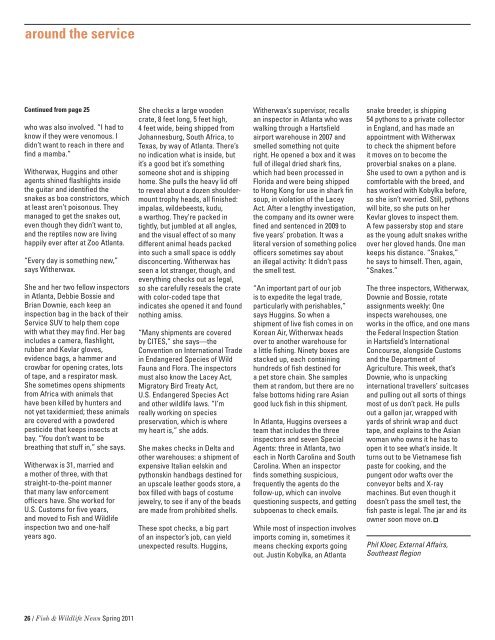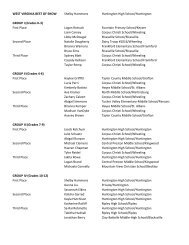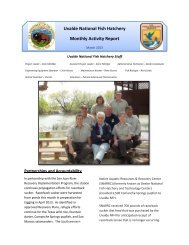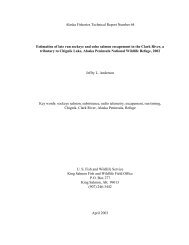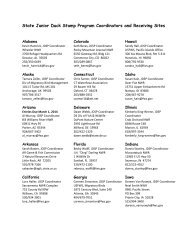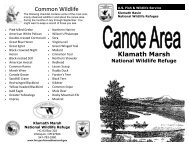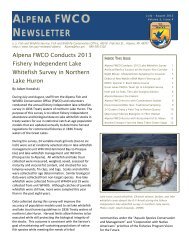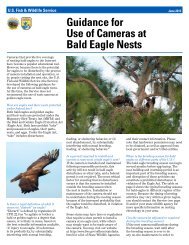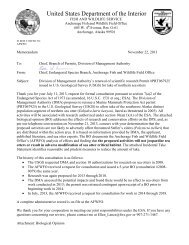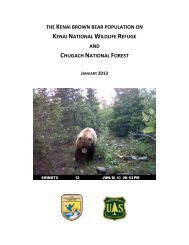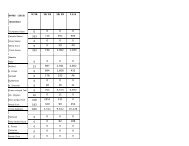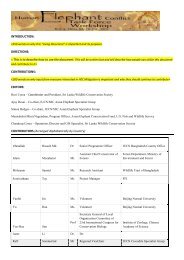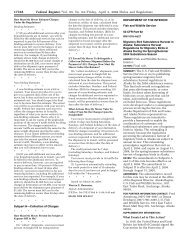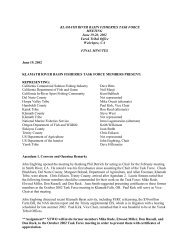Fish &Wildlife News - U.S. Fish and Wildlife Service
Fish &Wildlife News - U.S. Fish and Wildlife Service
Fish &Wildlife News - U.S. Fish and Wildlife Service
Create successful ePaper yourself
Turn your PDF publications into a flip-book with our unique Google optimized e-Paper software.
around the service<br />
Continued from page 25<br />
who was also involved. “I had to<br />
know if they were venomous. I<br />
didn’t want to reach in there <strong>and</strong><br />
find a mamba.”<br />
Witherwax, Huggins <strong>and</strong> other<br />
agents shined flashlights inside<br />
the guitar <strong>and</strong> identified the<br />
snakes as boa constrictors, which<br />
at least aren’t poisonous. They<br />
managed to get the snakes out,<br />
even though they didn’t want to,<br />
<strong>and</strong> the reptiles now are living<br />
happily ever after at Zoo Atlanta.<br />
“Every day is something new,”<br />
says Witherwax.<br />
She <strong>and</strong> her two fellow inspectors<br />
in Atlanta, Debbie Bossie <strong>and</strong><br />
Brian Downie, each keep an<br />
inspection bag in the back of their<br />
<strong>Service</strong> SUV to help them cope<br />
with what they may find. Her bag<br />
includes a camera, flashlight,<br />
rubber <strong>and</strong> Kevlar gloves,<br />
evidence bags, a hammer <strong>and</strong><br />
crowbar for opening crates, lots<br />
of tape, <strong>and</strong> a respirator mask.<br />
She sometimes opens shipments<br />
from Africa with animals that<br />
have been killed by hunters <strong>and</strong><br />
not yet taxidermied; these animals<br />
are covered with a powdered<br />
pesticide that keeps insects at<br />
bay. “You don’t want to be<br />
breathing that stuff in,” she says.<br />
Witherwax is 31, married <strong>and</strong><br />
a mother of three, with that<br />
straight-to-the-point manner<br />
that many law enforcement<br />
officers have. She worked for<br />
U.S. Customs for five years,<br />
<strong>and</strong> moved to <strong>Fish</strong> <strong>and</strong> <strong>Wildlife</strong><br />
inspection two <strong>and</strong> one-half<br />
years ago.<br />
She checks a large wooden<br />
crate, 8 feet long, 5 feet high,<br />
4 feet wide, being shipped from<br />
Johannesburg, South Africa, to<br />
Texas, by way of Atlanta. There’s<br />
no indication what is inside, but<br />
it’s a good bet it’s something<br />
someone shot <strong>and</strong> is shipping<br />
home. She pulls the heavy lid off<br />
to reveal about a dozen shouldermount<br />
trophy heads, all finished:<br />
impalas, wildebeests, kudu,<br />
a warthog. They’re packed in<br />
tightly, but jumbled at all angles,<br />
<strong>and</strong> the visual effect of so many<br />
different animal heads packed<br />
into such a small space is oddly<br />
disconcerting. Witherwax has<br />
seen a lot stranger, though, <strong>and</strong><br />
everything checks out as legal,<br />
so she carefully reseals the crate<br />
with color-coded tape that<br />
indicates she opened it <strong>and</strong> found<br />
nothing amiss.<br />
“Many shipments are covered<br />
by CITES,” she says—the<br />
Convention on International Trade<br />
in Endangered Species of Wild<br />
Fauna <strong>and</strong> Flora. The inspectors<br />
must also know the Lacey Act,<br />
Migratory Bird Treaty Act,<br />
U.S. Endangered Species Act<br />
<strong>and</strong> other wildlife laws. “I’m<br />
really working on species<br />
preservation, which is where<br />
my heart is,” she adds.<br />
She makes checks in Delta <strong>and</strong><br />
other warehouses: a shipment of<br />
expensive Italian eelskin <strong>and</strong><br />
pythonskin h<strong>and</strong>bags destined for<br />
an upscale leather goods store, a<br />
box filled with bags of costume<br />
jewelry, to see if any of the beads<br />
are made from prohibited shells.<br />
These spot checks, a big part<br />
of an inspector’s job, can yield<br />
unexpected results. Huggins,<br />
Witherwax’s supervisor, recalls<br />
an inspector in Atlanta who was<br />
walking through a Hartsfield<br />
airport warehouse in 2007 <strong>and</strong><br />
smelled something not quite<br />
right. He opened a box <strong>and</strong> it was<br />
full of illegal dried shark fins,<br />
which had been processed in<br />
Florida <strong>and</strong> were being shipped<br />
to Hong Kong for use in shark fin<br />
soup, in violation of the Lacey<br />
Act. After a lengthy investigation,<br />
the company <strong>and</strong> its owner were<br />
fined <strong>and</strong> sentenced in 2009 to<br />
five years’ probation. It was a<br />
literal version of something police<br />
officers sometimes say about<br />
an illegal activity: It didn’t pass<br />
the smell test.<br />
“An important part of our job<br />
is to expedite the legal trade,<br />
particularly with perishables,”<br />
says Huggins. So when a<br />
shipment of live fish comes in on<br />
Korean Air, Witherwax heads<br />
over to another warehouse for<br />
a little fishing. Ninety boxes are<br />
stacked up, each containing<br />
hundreds of fish destined for<br />
a pet store chain. She samples<br />
them at r<strong>and</strong>om, but there are no<br />
false bottoms hiding rare Asian<br />
good luck fish in this shipment.<br />
In Atlanta, Huggins oversees a<br />
team that includes the three<br />
inspectors <strong>and</strong> seven Special<br />
Agents: three in Atlanta, two<br />
each in North Carolina <strong>and</strong> South<br />
Carolina. When an inspector<br />
finds something suspicious,<br />
frequently the agents do the<br />
follow-up, which can involve<br />
questioning suspects, <strong>and</strong> getting<br />
subpoenas to check emails.<br />
While most of inspection involves<br />
imports coming in, sometimes it<br />
means checking exports going<br />
out. Justin Kobylka, an Atlanta<br />
snake breeder, is shipping<br />
54 pythons to a private collector<br />
in Engl<strong>and</strong>, <strong>and</strong> has made an<br />
appointment with Witherwax<br />
to check the shipment before<br />
it moves on to become the<br />
proverbial snakes on a plane.<br />
She used to own a python <strong>and</strong> is<br />
comfortable with the breed, <strong>and</strong><br />
has worked with Kobylka before,<br />
so she isn’t worried. Still, pythons<br />
will bite, so she puts on her<br />
Kevlar gloves to inspect them.<br />
A few passersby stop <strong>and</strong> stare<br />
as the young adult snakes writhe<br />
over her gloved h<strong>and</strong>s. One man<br />
keeps his distance. “Snakes,”<br />
he says to himself. Then, again,<br />
“Snakes.”<br />
The three inspectors, Witherwax,<br />
Downie <strong>and</strong> Bossie, rotate<br />
assignments weekly: One<br />
inspects warehouses, one<br />
works in the office, <strong>and</strong> one mans<br />
the Federal Inspection Station<br />
in Hartsfield’s International<br />
Concourse, alongside Customs<br />
<strong>and</strong> the Department of<br />
Agriculture. This week, that’s<br />
Downie, who is unpacking<br />
international travellers’ suitcases<br />
<strong>and</strong> pulling out all sorts of things<br />
most of us don’t pack. He pulls<br />
out a gallon jar, wrapped with<br />
yards of shrink wrap <strong>and</strong> duct<br />
tape, <strong>and</strong> explains to the Asian<br />
woman who owns it he has to<br />
open it to see what’s inside. It<br />
turns out to be Vietnamese fish<br />
paste for cooking, <strong>and</strong> the<br />
pungent odor wafts over the<br />
conveyor belts <strong>and</strong> X-ray<br />
machines. But even though it<br />
doesn’t pass the smell test, the<br />
fish paste is legal. The jar <strong>and</strong> its<br />
owner soon move on.<br />
Phil Kloer, External Affairs,<br />
Southeast Region<br />
26 / <strong>Fish</strong> & <strong>Wildlife</strong> <strong>News</strong> Spring 2011


